

Marshall Goldsmith Library. Providing feedback has long been considered to be an essential skill for leaders.
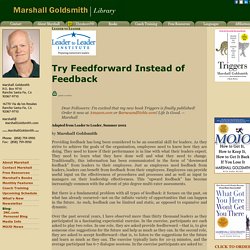
As they strive to achieve the goals of the organization, employees need to know how they are doing. They need to know if their performance is in line with what their leaders expect. They need to learn what they have done well and what they need to change. Traditionally, this information has been communicated in the form of “downward feedback” from leaders to their employees.
Feedback? Pah! Feed Forward... Feedforward paper 2006 june. Strengths Based Forward Coaching. Engagement and Disaffection in Classroom. Tom durham feed up feed forward and feedback effective leadership skills for supervisor. Making Sense of Assessment Feedback in Higher Education. Carol Evans Abstract This article presents a thematic analysis of the research evidence on assessment feedback in higher education (HE) from 2000 to 2012.
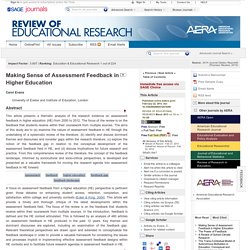
The focus of the review is on the feedback that students receive within their coursework from multiple sources. The aims of this study are to (a) examine the nature of assessment feedback in HE through the undertaking of a systematic review of the literature, (b) identify and discuss dominant themes and discourses and consider gaps within the research literature, (c) explore the notion of the feedback gap in relation to the conceptual development of the assessment feedback field in HE, and (d) discuss implications for future research and practice. From this comprehensive review of the literature, the concept of the feedback landscape, informed by sociocultural and socio-critical perspectives, is developed and presented as a valuable framework for moving the research agenda into assessment feedback in HE forward. Aims of the Study Method. 2013 Christine Watts PRP article. Bournemouth University. Is FeedForward the way forward? A comparison of the effects of FeedForward coaching and Feedback. - City Research Online.
McDowall, A., Freemann, K.
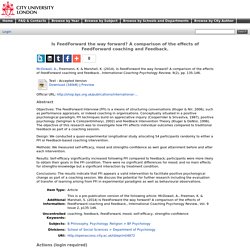
& Marshall, K. (2014). Is FeedForward the way forward? A comparison of the effects of FeedForward coaching and Feedback.. International Coaching Psychology Review, 9(2), pp. 135-146. Objectives: The FeedForward Interview (FFI) is a means of structuring conversations (Kluger & Nir, 2006), such as performance appraisals, or indeed coaching in organisations. Conceptually situated in a positive psychological paradigm, FFI techniques build on appreciative inquiry (Cooperrider & Srivastva, 1987), positive psychology (Seligman & Csikszentmihalyi, 2002) and Feedback Intervention Theory (Kluger & DeNisi, 1996). Design: We conducted a quasi-experimental longitudinal study allocating 54 participants randomly to either a FFI or Feedback-based coaching intervention. Methods: We measured self-efficacy, mood and strengths-confidence as well goal attainment before and after each intervention.
Google Search: Feed Forward in Higher Education. Marshall Goldsmith FeedForward Tool. Journal of Learning Development in Higher Education. Moody Lisa 2014 thesis. Feedback and feed forward. What are the issues?
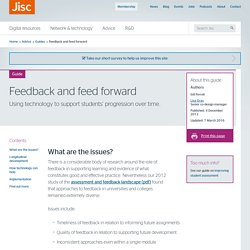
Does your feedback feed forward? Sddoct10 2. Feedback as Feed-Forward. 7 steps effective feedback 2011 3. ‘Feed forward’ – reframing feedback. Posted by: Ruth Moeller, Senior Advisor, Learning and Teaching, College of Design and Social Context, RMIT University.
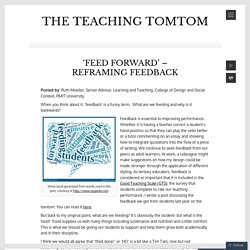
When you think about it, ‘feedback’ is a funny term. What are we feeding and why is it backwards? Feedback is essential to improving performance. Whether it is having a teacher correct a student’s hand position so that they can play the cello better or a tutor commenting on an essay and showing how to integrate quotations into the flow of a piece of writing. We continue to seek feedback from our peers as adult learners. But back to my original point, what are we feeding?
Why Feed Forward instead of Feedback? - Direction in Leadership and Diversity. Home | Artikelen | Why Feed Forward instead of Feedback?
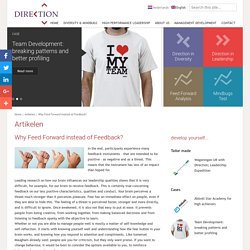
Artikelen In the end, participants experience many feedback instruments – that are intended to be positive – as negative and as a threat. This means that the instrument has less of an impact than hoped for. Leading research on how our brain influences our leadership qualities shows that it is very difficult, for example, for our brain to receive feedback. Do you offer feedback or feed forward? #ASCD15. I had the opportunity t to talk to the assistant principal and two teachers from Magnolia Elementary today, winners of the ASCD Whole Child Vision and Action award today.
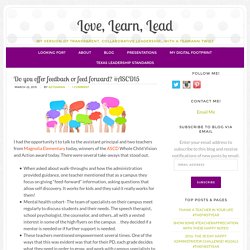
There were several take-aways that stood out. When asked about walk-throughs and how the administration provided guidance, one teacher mentioned that as a campus they focus on giving “feed-forward” information, asking questions that allow self discovery. It works for kids and they said it really works for them! Mental health cohort- The team of specialists on their campus meet regularly to discuss students and their needs. The speech therapist, school psychologist, the counselor, and others..all with a vested interest in some of the high flyers on the campus…they decided if a mentor is needed or if further support is needed.These teachers mentioned empowerment several times.
It is time to make way for feedforward…instead of feedback! Feedback is an essential part of all managers’ responsibilities.
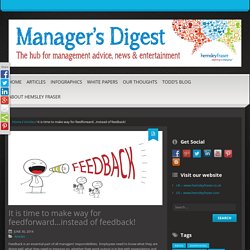
Employees need to know what they are doing well, what they need to improve on, whether their work output is in line with expectations and how well they are contributing to achieve the team or organisation’s goals. From feedback to feedforward. Traditional performance appraisal systems have long been criticised for being ineffective in terms of motivating employees and improving performance.
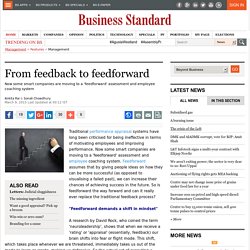
Now some smart companies are moving to a 'feedforward' assessment and employee coaching system. Try Feedforward (instead of feedback) Provide ‘Feedforward’ with Exemplars. There is growing interest in the pedagogical literature in something called feedforward.
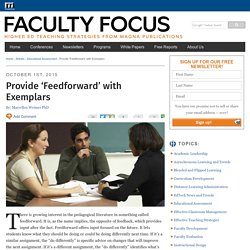
It is, as the name implies, the opposite of feedback, which provides input after the fact. Feedforward offers input focused on the future. It lets students know what they should be doing or could be doing differently next time. If it’s a similar assignment, the “do differently” is specific advice on changes that will improve the next assignment. If it’s a different assignment, the “do differently” identifies what’s not the same about the next assignment and what needs to be done in a different way. In the article referenced here, the interest was exams and the fact, especially for finals, that students get little or no feedback, not through any fault of the professor but simply because the course is over.
Current interest in rubrics means that more often now students are receiving grading criteria before the fact rather than after it. Reference: Scoles, J., Huxham, M., and McArthur, J. (2013). Try Feedforward Instead of Feedback: 11 reasons to try feedforward. 3.0 from 10 votes Posted on 05/08/2014, by: Providing feedback has long been considered to be an essential skill for leaders. As they strive to achieve the goals of the organization, employees need to know how they are doing. Stop Giving Feedback, Instead Give Feedforward. Previously I wrote an article on the evils of traditional, annual performance appraisals. It’s an old ritual that is flawed because of the annual schedule, one-size-fits-all evaluation standards, simplistic 5-point scale, and the fact that criticism is tied to compensation. While performance appraisals must be eradicated, rigorous performance systems—ones based on Feedforward Coaching, not annual feedback—are the secret to creating engaged, Superhuman Capital.
The entire idea of Feedforward Coaching is that it is a continuous process focused on future performance and career pathing—it’s not grading a year’s worth of past events; the manager serves as Coach, not Executioner.